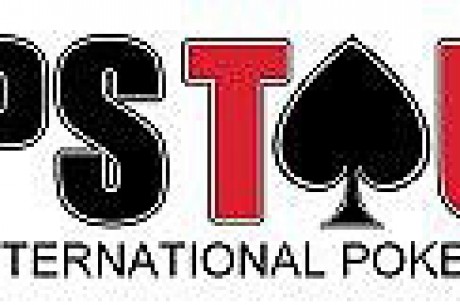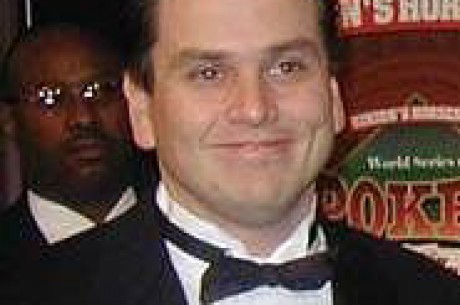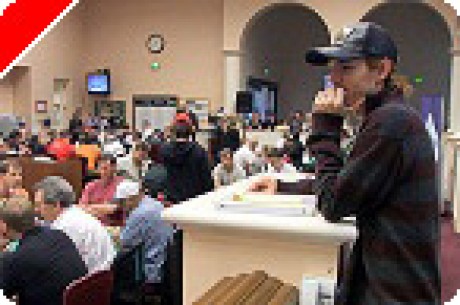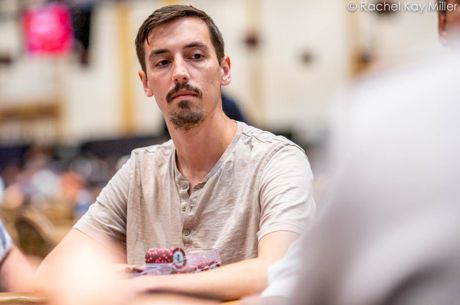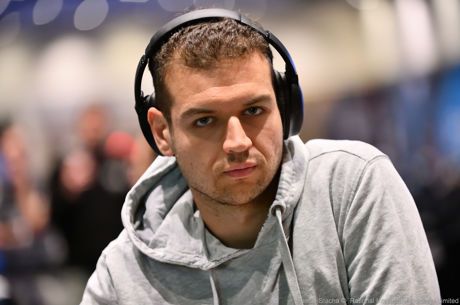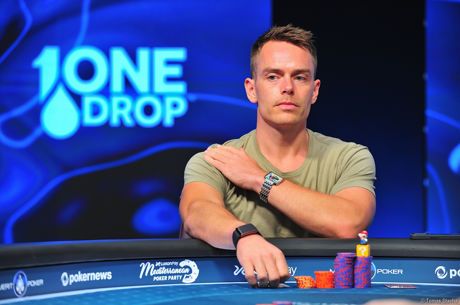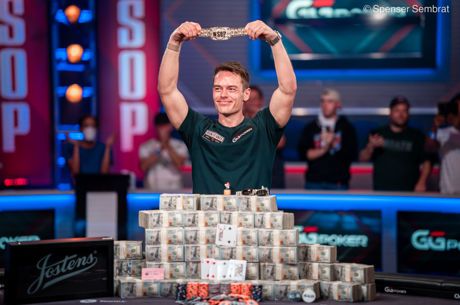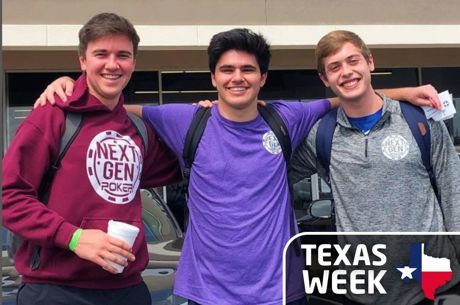David Slan - David among the Goliaths of Poker
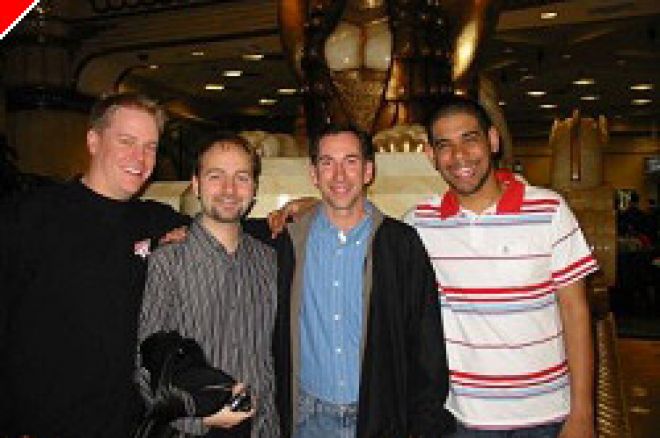
Readers may remember our following of David 'Piano Man' Slan through his trials and tribulations of his first $10,000 event, the recent LA Poker Classic. David went nearly all the way, finishing 11th out of 538 entries. The amateur's perspective to these major events is always unique, as it is all a new experience for them.
With poker tournaments, you can normally count on the usual cast of players to be among the contenders. You can also count on the unusual; the first time or "amateur" players making some noise as they step to the felt to take on the kings and queens of the poker world. In these tournaments, it is the amateur's stories that are more often than not the most interesting ones to hear.
Much like the Biblical David, cast into the lion's den of the Emperor, amateur David Slan found himself in the enviable position of being that rookie making his run at the "big time" at the L. A. Poker Classic in February. After a first day of struggles, David found his game and used it against the professionals arranged against him to barely miss out on a top ten finish. His name will be listed above such notables as Freddy Deeb, Andy Bloch, former World Champion Dan Harrington, and defending WPT Champion Martin deKnijff for eternity, giving him an achievement that most amateurs, like David himself, will prize for the remaining years of their lives.
I had a chance to sit back with David and reminisce with him regarding his run in Los Angeles and get his views for other amateur players as they decide to take their chance at the professional poker world.
PN: How long have you been playing poker?
DS: I began playing poker in high school with my friends (nickel, dime, quarter), mostly seven card stud. In college at Washington University in St. Louis, I played more seriously for spending money. My father was a college professor, so I never had a great deal of extra cash. After going out into the working world, I found myself in Burlington, Iowa where, at that time, poker was played in the bars (I don't know if it still is). I'd play after work on Friday and Saturday nights against a bunch of tough old guys. I ended up traveling around in my extra time with a pool player. He'd rustle up nine ball games, and I'd play poker.
PN: What interrupted your play? Was it business or family that suspended your play?
DS: After moving from Burlington, Iowa to Central Illinois, I did a leveraged buyout of two locations of the company I was working for, Byerly Music. This took a great deal of time and effort to grow the business. The business grew to seven locations. I sold the last of that business in 1995 to a competitor. The Steinway dealership I own in St. Louis was opened in 1993 and still operates today.
PN: Was the L. A. Poker Classic your first event in a "professional" arena?
DS: The L. A. Poker Classic was my first professional event. I have primarily been a cash game player. I entered a 100 person WSOP qualifier at Harrah's in St. Louis (my only other tournament), made the final table and finished in 7th place.
PN: How did you get into the Classic?
DS: I played in the $1000 Super Satellite the day before the Main Event. There were 278 or so entered and we played down to 23, who all received seats to the Championship.
PN: How did you get over the initial nervousness of playing in the "big time"?
DS: I have always been very comfortable at a poker table. Beyond the normal jitters you have when you are in a competitive situation, the transition was pretty seamless. I was short stacked with about 12,000 at the beginning of Day 3, and had Freddy Deeb, Barry Shulman, and Young Phan at my table most of the day. They are all excellent players, but I managed to grow my stack to about 62,000 before the table broke up. By the time I got to the final three tables, I felt like I could compete with the remaining players.
PN: At what point did you think you were going to do well?
DS: Before I began the main event, I thought I could do well. I played very well in the Super Satellite. One of the players that had been playing with me during the Satellite offered to buy a piece of me in the Main Event. He looked at me and said, "I really think you could win this thing." I was so surprised! He was a fine player, and he really thought I had a chance. I didn't take the deal because I didn't want the pressure of playing for someone else's money. But this bolstered my confidence. Even when I was short chipped, I never really felt I was out of it. I knew I could get them back.
PN: Did you entertain thoughts of winning the whole thing?
DS: When I went all-in to Freddy (Deeb) with three tables left and made my flush just before the dinner break, I thought I could win. I had 520K in chips and was in about fourth chip position. My rhythm was very good, and I felt comfortable that if things went my way, I could win. If you don't really believe you can win, I can't imagine even playing.
PN: What were some memorable points during the tournament?
DS: I had a great hand very early in the tournament with Raul Paez at my first table. He had Ac-Jc and I had Ah-As. He ended up having the top two pair and the nut flush draw and I ended up with a full house. He called my all-in on the turn and lost most of his chips. There was really nothing he could do.
I ended up losing half my stack to Phil Laak right after the dinner break at the same table when he had aces and I had kings. There was just no way to get away from the hand. You know the story of Phil e-mailing my son at home while he was playing poker with his buddies (after beating him on the hand, David asked if he could get a photo on his cellular phone to send to his son. "The Unabomber" went one step further after the photo and graciously e-mailed David's son in St. Louis from his Blackberry).
Another big hand was when I went all-in with 10-10 before the flop and the other guy had A-A. I caught a ten on the turn and survived. Another memorable moment was just before the end of Day Three. I flopped a straight and called an all-in bet from Harabalos (Voulgaris, the eventual runner-up to Michael "The Grinder" Mizrachi) who had two pair, aces and jacks. It doubled me up to $252K and set me up for the final three table.
At the end of the second day, there was about an hour to go and I was in good shape. I had built my chip stack up to about 36,000 and decided to be conservative before going to bed. Chip Reese was at my table, three seats to the right. Every time if there was no opener to him, he would raise about two times the blind. Invariably, I had two terrible cards and had to fold (as did other blinds in the same position). He did it again on my big blind, but this time I looked down and had A-8. He raised two times the big blind. It was folded to me and I immediately went over the top for what I thought was about 2/3 of the pot. However, I grabbed the wrong amount of chips and ended up raising only 1/4 of the pot. Of course, he had to call no matter what he had...OOPS number one! The flop came J-10-8. He bet about 1/3 of the pot - what I thought was an obvious probe bet. I thought about it, and went all in with my pair of 8s. I had about twice as many chips as he did, but he immediately called...OOPS number two! He flipped over J-10 for the top two pair. Needless to say, I lost half my chips and felt like an idiot. I just made a stupid play on one of the best poker players in the history of the game.
The next day, I ran into Chip downstairs in the casino and told him how dumb I felt. He was very kind to me and had an interesting take. He said he thought it was a pretty good move. If he hadn't had two pair, even if he had top pair, he probably would have had to fold. With my pre-flop raise, and all-in bet, he didn't think he could risk his tournament on one medium pair. This was a huge shock to me. He didn't think I was dumb at all. Anyway, we talked about a few other things and he was very cordial. If I had actually thought it through that way, I would have felt even better. Either way, it made me realize that there are a lot of ways to play a hand. Good lesson from a master.
It was a real honor to play with the pros throughout the tournament. These men and women are the pioneers of this sport, and deserve all the recognition and money coming to them. To a person, all the players were very kind and encouraging to me throughout the event.
PN: What did you learn from playing alongside the pros?
DS: This is a great question. I learned a lot. There were several players that had big impact on my play. I played for a long time with John Phan on Wednesday night. What a masterful strategy he uses to dominate and intimidate the table. Although I don't think I can play that aggressively, there were a few strategies that I now employ. Greg "Full Blown Tilt" Mueller is another excellent player that had some very interesting ideas for betting before the flop and building your chip stack. Just watching the titans of poker play hour after hour was a real learning experience. I try to notice everything, and there was a lot to notice.
PN: Did you notice improvements in your own game as the tournament progressed?
DS: Absolutely. I think the high level of play encourages you to play better. Plus, by watching and learning from the masters, I played progressively better (most of the time).
PN: What were the major pressures, real or imagined, that you faced as the tournament progressed?
DS: As the blinds continue to rise, this puts pressure on you to play when you may not really want to. Throughout the tournament, I really felt fairly comfortable. At the very end, I think I imagined the blinds to be more of a problem than they were.
PN: Your son provided you with some inspiration during the tournament. Is he as good as Dad?
DS: My son, Michael, is a great kid and a pretty good poker player. He and his buddies are 15 years old. I can tell you that they play a lot better poker than I did when I was 15!
PN: Would you encourage your son to take the step of playing in the major tournaments?
DS: I encourage my son to do whatever makes him happy.
PN: What was the response of your friends and family after your return to St. Louis?
DS: It was a lot of fun. My son's high school friends followed the tournament on line. My stock at my son's school definitely went up! The newspaper ran an a short column about it and you would have thought I won the World Series. Everybody called to congratulate me. My golf club (my other recreational love other than poker) put up a big poster congratulating me. Now the club is going to have a Hold 'Em night in April.
I think that the biggest surprise to most people was the amount of money. This was a real shock to most people. The Buick PGA golf tournament was going on at Riviera while we were playing. The top two finishers at that PGA event received less money than Mike and Harabalos. Pretty impressive.
PN: After your success in Los Angeles, do you consider yourself a "professional" now?
DS: No. When you make your living from playing poker and you put in your dues, then you can call yourself a pro. I'd like to think I'm a pretty good amateur.
PN: Are you going to take more shots at the WPT or the WSOP?
DS: Yes, I plan to play at the WSOP Circuit Tournament at the Rio in Las Vegas. I think I will try to play in about 4-5 major events each year.
PN: What does an amateur have to remember the most when they step into the WPT tour?
DS: The quality of play is very high and mistakes are usually punished severely. It is important to keep your concentration on every hand. Most amateurs would not be used to playing eleven hours a day for five days in a row. One bad mistake, and you are gone. You also cannot be intimidated by high profile players. You will probably have one at your table. If these players sense weakness, they will run right over you. It is important to play the game you are comfortable with, but don't back down when you have the winner.
PN: What information would you pass along to someone who wants to do what you did?
DS: It's not as easy as it looks on TV!
PN: Congratulations again and thank you, David.
DS: Thank you!
I want to thank David for taking the time to discuss his success at the L. A. Poker Classic. His story should prove to all amateur, home game and online players that yes, you too have the abilities and the opportunity to sit with the greats of our game and, in one glorious week, prove that you belong at the poker tables!
Please visit our online poker room directory to see the best bonuses on the web!

